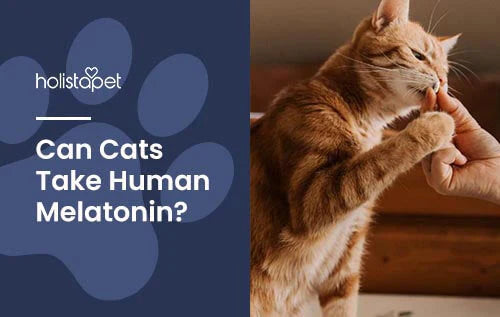Concerned pet parents often wonder, "Can I give my cat human melatonin?" It's a question many cat owners ask when their feline friends struggle with sleep problems. While melatonin is a famous sleep aid that helps regulate sleep patterns, giving your furry friend melatonin supplements for humans may not be the best option.
You see, our feline companions have unique needs. So, giving your cat melatonin specifically formulated for them is crucial. But how do you do it correctly? Don't worry; we have all the information you'll need to approach supplementation for your feline friend with utmost care. Let's go ahead and discuss melatonin's benefits, dosage recommendations, and safety guidelines.

What Is Melatonin and How Does It Work?
Melatonin is a natural hormone produced by the pineal gland in the brain in both humans and animals. It helps regulate sleep-wake cycles by telling the body it's time for some shuteye.
Light exposure influences melatonin production. When it's dark, the body produces more melatonin, which promotes better sleep cycles.
The natural hormone has a relaxing effect that can help manage a cat's sleep-wake cycle. When used as a supplement, cat parents must pick melatonin formulations designed for a cat's body. This is key to ensuring safety and effectiveness.
Common Uses of Human Melatonin Products
Humans mainly use melatonin supplements to sleep better. Human products infused with melatonin can help:
- Improve Sleep Quality. May enhance sleep quality by promoting deeper and more restful sleep cycles.
- Manage Sleep Disorders. May address sleep disorders like insomnia by helping regulate sleep patterns.
- Ease Jet Lag. May ease jet lag by adjusting internal clocks to new time zones.
- Adjust Sleep Schedules. May aid in resetting sleep schedules. Useful for shift workers or those with irregular sleep patterns.
Is Melatonin Safe for Cats?
Melatonin is generally safe for our feline friends when used appropriately. This means administering cat-safe formulations and dosages. So, before giving melatonin to your pet, consult your vet. They can recommend the proper dosage and formulation to supplement your cat safely and effectively.
Can I Give My Cat Melatonin for Humans?
It's not recommended to give your cat melatonin for humans. Human supplements often contain ingredients and dosages that may be unsafe for felines. This combination can lead to unwanted side effects.
It's best to choose a feline melatonin supplement. By doing so, you can rest assured the melatonin product can meet your kitty's unique needs.
Human Melatonin vs Cat Melatonin - The Differences
Several factors differentiate human melatonin from cat melatonin. Keep these in mind when choosing a supplement for your feline friend:
- Dosage. Human melatonin usually contains higher dosages, while feline melatonin has the right amount for a cat's body.
- Ingredients. Human melatonin may include additives or fillers that are harmful to pets. Cat melatonin uses feline-friendly ingredients.
- Forms. Human melatonin often comes in tablets or gummies. Cat-safe melatonin comes in more convenient forms, like soft chews and liquid drops.
- Flavoring. Human supplements might not taste good for pets. Feline melatonin has flavors that are more appealing to kitties.

Why Should I Choose Melatonin Made for Cats?
Using cat melatonin can help reduce the risk of unwanted side effects. Your furry friend can safely receive the recommended dose and suitable ingredients. Choosing the right melatonin supplement will not only help with your cat's specific sleep issues but will also make supplementation a positive experience.
What Cat Melatonin Products Are Available in the Market?
Feline melatonin supplements come in various convenient forms. They include:
- Soft Chews and Treats. These melatonin-infused cat treats make administration easy. They can double as rewards during training and play sessions.
- Tablets and Capsules. You can administer melatonin in tablet or capsule form if you have a cooperative pet. These forms can ensure precise dosing.
- Liquids and Drops. For fussy kitties, cat owners can mix liquid forms with food. They can also place the drops directly in their pet's mouth.
Potential Benefits of Cat Melatonin
Melatonin brings several potential benefits that can help improve your cat's life. From promoting relaxation to managing sleep issues, cat melatonin can be a vital wellness resource. As you explore its uses, you'll find it can be a helpful addition to your kitty's routine.
Promotes Relaxation and Restful Sleep
Melatonin has calming properties that promote relaxation and sleep. By supporting the natural sleep-wake cycle, melatonin can influence cats to wind down, especially at night when they might otherwise be active. This support can help restless pets relax and maintain consistent sleep patterns.
May Ease Anxiety and Agitation
To keep your cat calm during stressful events, keep some melatonin handy. Its soothing effect can help reduce nervous behaviors, helping kitties feel secure during vet visits, loud parties, and other challenging situations. With melatonin, your pet can better cope with their fears and worries.
Helps Manage Sleep Issues
If your furry friend has trouble falling asleep or staying asleep, melatonin can help. When cats sleep better at night, they can feel refreshed and balanced during the day. Older cats or pets with sleep problems benefit most from this sleep support.
Encourages Calm During Heat Cycles
Heat cycles can often lead to disruptive behaviors in female cats. Melatonin may help suppress heat cycles and make pets feel more relaxed. Melatonin can influence the hormones that regulate the reproductive process, helping manage or delay heat cycles altogether.
Aids in Travel and Boarding
Travel and boarding can be extremely stressful for feline pets. These experiences can often cause agitation and nervous behaviors. Melatonin can help promote calm during these events. Its soothing properties can help your kitty handle long car rides and unfamiliar environments better.
Potential Risks and Side Effects of Melatonin for Cats
While melatonin is typically safe for cats, some potential risks and side effects exist. Melatonin use can sometimes result in:
- Drowsiness. Some cats may become overly drowsy and seem lethargic.
- Digestive Issues. Melatonin may cause mild stomach upset or queasiness.
- Allergic Reactions. Although rare, some cats experience allergic reactions.
- Increased Appetite. Melatonin use can sometimes lead to increased appetite.
- Drug Interactions. Melatonin may interact with other medications, so consulting your vet is important.
Recommended Melatonin Dosage for Cats
How much melatonin a cat needs depends on the cat's age, size, and specific needs. The recommended dose typically ranges from 1 to 3 mg. For kittens and small breeds, 1 mg is usually enough. Medium-sized adult cats may need around 2 mg, while larger pets might need 3 mg.
It's best to start with a low dose. Then, you can slowly adjust the amount under your vet's guidance. Always follow your vet's expert advice to avoid issues down the line.
Additional Cat Calming Options
Several other options can help keep your kitty calm and well-rested. If you're looking for alternatives or supplements to melatonin, try the following:
- CBD for Cats. CBD (cannabidiol) brings a natural calming effect generally well-tolerated by cats. For high-quality options, we recommend HolistaPet's CBD cat products: CBD Oil, CBD Cat Treats, and CBD Calming Chews. We use only premium, broad-spectrum CBD in our offerings. This means there's no THC (tetrahydrocannabinol), the mind-altering compound in cannabis, in them.
- Quality Time. Spending time with your cat can help reduce their anxious behaviors and strengthen your bond with each other.
- Regular Exercise. Engaging your pet in regular play can help burn off their excess energy.
- A Consistent Routine. Maintaining a predictable schedule can help your kitty feel secure.
- A Calming Environment. Creating a peaceful space with familiar items can help your cat feel safe.
- Training and Positive Reinforcement. Using positive reinforcement can encourage calm behavior and reduce uneasiness over time.
Frequently Asked Questions About Cats and Melatonin Use
Many cat parents have questions about melatonin use for their furry friends. Understanding the correct usage, possible benefits, and risks can help you make informed decisions for your pet. Let's discuss some of your burning questions about this natural remedy.
My Cat Ate Human Melatonin. What Should I Do?
If your cat accidentally takes human melatonin, watch them closely for symptoms such as drowsiness, tummy upset, or behavioral changes. Human supplements can contain ingredients that aren't safe for felines, so consult your vet immediately for advice on what to do next.
How Do I Ensure Proper Dosage for My Cat?
You can optimize melatonin's benefits with proper dosing. Try the following tips:
- Consult Your Vet. Follow veterinary medicine guidelines to keep your kitty safe during melatonin use.
- Use Cat-Specific Melatonin. Choose products made for cats for safe and accurate dosing.
- Administer Carefully. Give your cat melatonin as directed by your vet or the manufacturer to ensure the correct dosage and timing.
- Observe Your Cat. Keep an eye on your pet's behavior and health after giving melatonin. Report any unwanted changes to your vet.
- Adjust If Needed. Make dosage adjustments under your vet's guidance to prevent any harsh effects.
Can Cats Overdose on Melatonin, and What Are the Signs?
Yes, cats can overdose on melatonin if they're given too much. Signs of a melatonin overdose may include excessive drowsiness, lethargy, vomiting, diarrhea, agitation, and confusion. If you suspect your furry friend has overdosed on melatonin, go to the vet, stat. Prompt treatment can help prevent complications.
When Should Cats Take Melatonin?
Cats can take melatonin when they experience difficulty sleeping, anxiety, or agitation during stressful situations. In terms of timing, generally, giving melatonin in the evening can help manage their sleep cycle and support proper rest. Ask your vet about the best timing for your pet based on their needs and circumstances. Doing so will help your kitty enjoy their supplement's full benefits.
How Long Does It Take for Cat Melatonin To Work?
Melatonin typically takes effect in cats within 30 minutes to an hour after administration. This timeframe can vary depending on the individual cat and the form of melatonin used. For the best results, give melatonin to your pet shortly before bedtime or an anticipated stressful situation. Monitoring your cat's response will help you understand how quickly the supplement works for them.
Final Thoughts - Can I Give My Cat Human Melatonin?
While the question "Can I give my cat human melatonin?" is common, the safest answer is to avoid it. Cats have unique needs, and human products may not suit them well. It's always better to choose melatonin products specifically designed for kitties to ensure the best results.
For quality alternatives, HolistaPet offers a range of calming CBD products tailored for your feline friend. Remember, choosing the right supplement can bring your best friend the calm they need and deserve.







![Probiotics For Dogs [Soft Chews] - HolistaPet](http://www.holistapet.com/cdn/shop/files/Probiotic-Infographic-1_472d7a29-e30c-435a-9638-1365d8c3a9f9.jpg?v=1725384841&width=104)




























Leave a comment
All comments are moderated before being published.
This site is protected by hCaptcha and the hCaptcha Privacy Policy and Terms of Service apply.